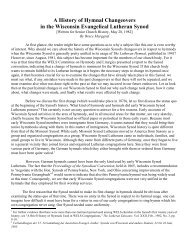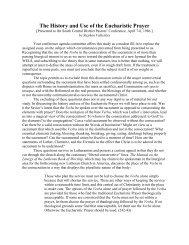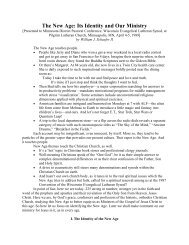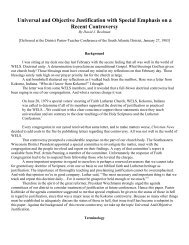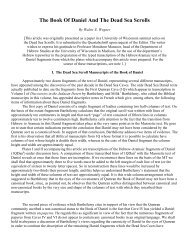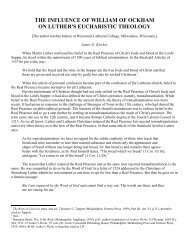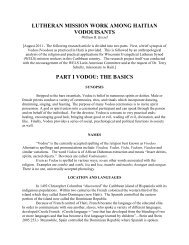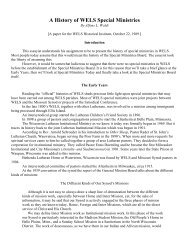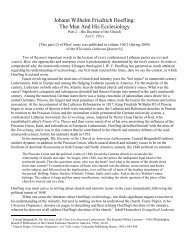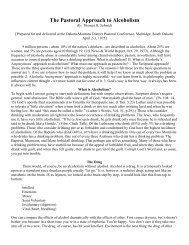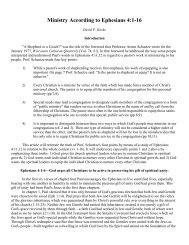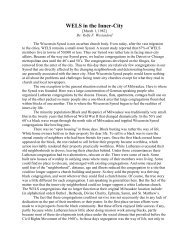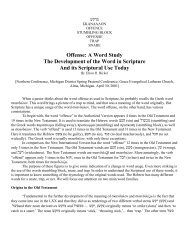Strangers to Sisters - Wisconsin Lutheran Seminary Library: Essays
Strangers to Sisters - Wisconsin Lutheran Seminary Library: Essays
Strangers to Sisters - Wisconsin Lutheran Seminary Library: Essays
You also want an ePaper? Increase the reach of your titles
YUMPU automatically turns print PDFs into web optimized ePapers that Google loves.
congregation, not us listeners.” Certainly it has <strong>to</strong> do with<br />
those who expound God’s Word publicly in a congregation,<br />
those who instruct the Word…But it is a great and fatal<br />
mistake <strong>to</strong> thing that it only has <strong>to</strong> do with them. No, it<br />
likewise has much <strong>to</strong> do with those who are instructed in<br />
the Word, all who want <strong>to</strong> be Christians. 72 (Emphasis mine)<br />
Bleken goes on <strong>to</strong> say that there are three forces that are always trying <strong>to</strong> corrupt<br />
the proper application of Sola Scriptura in the life of the church: rationalism, mysticism,<br />
and tradition, all of which erode the authority of the clear, simple words of the divinely<br />
inspired Scripture. 73 These three dangers are expounded upon further by later essayists. In<br />
his 1943 convention essay Sola Scriptura, Justin Peterson expounds on the danger of the<br />
misapplying reason in biblical hermeneutics,<br />
Reason has its place and use in the study of God’s Word.<br />
We need our reason <strong>to</strong> understand the meaning of the<br />
words used in Scripture. We must observe the fixed laws of<br />
language. And we must be able <strong>to</strong> think logically…Reason<br />
makes a good servant of theology, but a very poor master.<br />
When human reason would sit in judgment upon God’s<br />
Word, it is setting itself up as God, placing itself above<br />
God. Luther uses harsh language, but not <strong>to</strong>o harsh, in<br />
describing this brazen effrontery of human reason. He calls<br />
reason “Satan’s paramour,” and the “enemy of faith.” 74<br />
Similarly, S.C. Ylivsaker also warns against misapplying reason in biblical hermeneutics<br />
in his 1938 conventions essay, “The Clearness of Scripture,” when he comments,<br />
Reason is not there <strong>to</strong> make Scripture clear, as if it were<br />
unclear. Reason is not there <strong>to</strong> play master, as if the Word<br />
of God can be made a servant <strong>to</strong> the whims and fancies of<br />
reasons. Reason is not there <strong>to</strong> test Scripture in order <strong>to</strong><br />
determine whether it speaks logically and reasonably or<br />
not; or <strong>to</strong> strain the words of Scripture as a prospec<strong>to</strong>r<br />
72 M.K. Bleken, “The Scriptural Principle” (paper presented <strong>to</strong> the 2 nd regular convention of the Norwegian<br />
Synod of the American Evangelical <strong>Lutheran</strong> Church, Albert Lea, MN, May 29-June 4, 1919.), 5.<br />
Translation by Rev. Mark DeGarmeaux.<br />
73 Bleken, The Scriptural Principle, 11.<br />
74 Justin Petersen, “Sola Scriptura” <strong>Lutheran</strong> Synod Quarterly 42, nos. 2&3 (June/September 2002), 235.<br />
43



